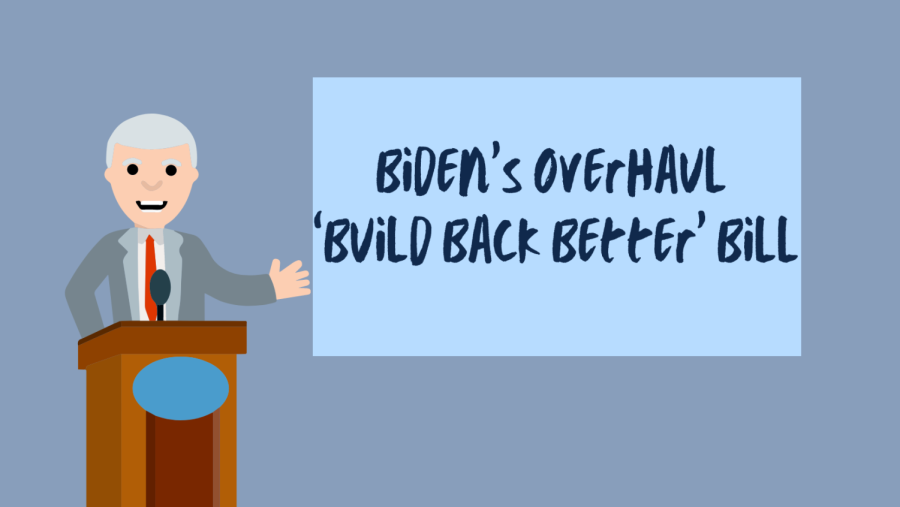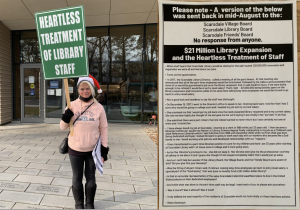Biden’s Overhaul ‘Build Back Better’ Bill
The House Democrats Biden’s ‘Build Back Better’ Bill, which is essential to his economic agenda.
December 2, 2021
Following months of deliberations, the House Democrats passed an overhaul $1.75 trillion ‘Build Back Better’ social, economic, and infrastructure policy, comprising a key piece of President Joe Biden’s economic agenda. The Bill aims to supplement and improve relief measures to address the COVID-19 pandemic, improvements in climate infrastructure, strengthening the social safety net, including familial advancements. “[This bill is] historic, transformative, and larger than anything we have ever done before,” declared Speaker of the House Nancy Pelosi on Friday, November 19th. “We are building back better. If you are a parent, senior, child, worker, American—this bill is for you.” Here are the bill’s most significant provisions:
Universal Pre-K
Expands Pre-Kindergarten access to over 6 million 3-to-4 year olds.
Child Care
Limits child care costs for children under age 6 to at most 7% of familial income for those earning up to 250% of respective state median income, expanding access to over 20 million children.
Paid Family and Sick Leave
Includes four weeks of federally funded paid leave for families to which this is not already granted.
Enhanced Child Tax Credit
Provides $300 a month for children aged under 6, and $250 a month for children aged 6-17, for heads of household making up to $125k, or a joint household income of less than $150k. Extending to 35 million families, this section of the bill aims to enhance the $1.9 trillion COVID relief package through 2022, where previously the bill sanctioned these monthly payments through 2021.
Earned Income Tax Credit
Extends the earned income tax credit through 2022, helping over 17 million low-wage childless workers. Triples the maximum credit childless workers are eligible to receive, extends eligibility, and expands the minimum and maximum age limits.
Home Health Care/Affordable Care Act/Medicaid Expansion
In aiming to reduce the nearly eight-hundred thousand people on Medicaid waiting lists (a program that reduces healthcare costs), the bill improves Medicaid coverage for home care services for the infirm, and aims to improve the quality of care-giving jobs. It also calls for the expansion of Affordable Care Act subsidies to low-income families in states that have not yet, or have refused to endorse the expansion of Medicaid.
Climate Change
Delivers nearly $570 billion in the forms of investments of tax credits in the aims of combating climate change. The investments aim to provide incentives to expand supply chains for solar and wind industries, thereby improving efficiency, reducing cost, increasing climate resilience, and increasing usage. The bill offers tax credits to families that endorse climate resilient activities, such as installing solar panels or buying electric vehicles.
Affordable Housing
Funnels $25 billion into the construction, rehabilitation, and purchase of low-income housing for low-income households, thereby encouraging the creation and preservation of affordable housing. The bill also provides $65 billion for addressing the backlog of public housing and for bolstering rental assistance. Provides $24 billion for payment assistance, community-led redevelopment projects, housing vouchers, and support services, for under-resourced communities predominantly African-American and Hispanic.
Pell Grants
Increases the maximum Pell Grant (A subsidy to help low-income students pay for college) to $550 for more than 5 million students enrolled in public and private institutions. Dreamers, or undocumented immigrants brought to the U.S. as children, are also provided eligibility. The grants are going to be especially invested into historically Black colleges and universities (HBCUs).
School Meals
Expands free school meals to nearly 9 million more students during the school year, and provides 29 million households with $65 per child per month in an effort to help parents pay for meals during summertime.
Immigration
Calls for a $100 Billion investment for the reformation of the nation’s immigration system. Aims to reduce backlogs, expand the ability for legal representation, and make changes to the asylum apparatus and border processing, all to expedite the lengthy, arduous, and dangerous immigration procedure.
Tax Deduction Cap
Repeals the $10,000 cap placed upon local and state taxes and increases the cap to $80,000. (Tax deductions are deductions on taxable income, for example; Health insurance, self-employment, student loan interest, etc.)
Who’s paying?
In a virulent speech lasting over 8 hours, House Minority Leader Kevin McCarthy (R-CA) called the legislation the “single most reckless and irresponsible spending bill in our nation’s history.” Thursday, November 18th, the nonpartisan Congressional Budget Office (CBO) stated that the ‘Build Back Better’ package would increase the federal budget deficit by $160 billion throughout the following 10 years. Many in Congress worry that the bill is far too fiscally irresponsible, risking potentially fueling further inflation, which is currently at its highest rate in thirty years.
However, House Democrats maintain that the spending package will compensate itself through provisions on increased taxes for corporations and the wealthy. White House officials and past I.R.S. commissioners claim the CBO’s estimates are too conservative; Treasury Department estimates for I.R.S. revenues say the overall bill would reduce the federal budget deficit by $112 billion. Here are some of the ways House Democrats believe the bill will reimburse itself:
Corporate Taxes
Imposes a 15% minimum tax on domestic and foreign Corporate Income for large companies that amass more than $1 Billion in profits.
Taxes on the Rich
Levies a 5% surcharge on household incomes above $10 million, and an additional 3% over $25 million. Also closes loopholes that allow some affluent taxpayers to avoid previous methods of taxation.
IRS Enforcement
Strengthens IRS tax collection enforcement to ensure proper taxation for those earning over $400,000 a year.
Medicare Drug Negotiation
Empowers Medicare (The national health insurance organization) to negotiate the prices of a set list of costly medications to ensure greater distribution to patients. Penalties are placed for drug companies that increase their prices at a faster rate than that of inflation (Essentially, drugs must be kept at the same price, with respect to the value of money). Restrictions are placed in such a way that disabled and elderly persons cannot pay more than $2,000 for medications, and caps insulin at $35 a month.
Drug Rebate Rule
Inhibits drug manufacturers from providing rebates to pharmacy benefit managers and insurers (Companies that govern prescription drug benefits on the behalf of healthcare insurers). Discounts, instead, will be mandated directly to patients.
Future of the Bill
Initially, the White House anticipated additional funds through further increased tax rates for corporations and wealthy individuals, however, opposition from moderate Democrats and House conservatives forced the Biden Administration to modify such a plan. The current bill also excludes a billionaire’s income tax, originally proposed by Ron Wyden (D-OR) that would garner increased compensation from the roughly 700 billionaires residing in America.
House Democrats urge centrists and conservatives in Congress to aid in the passage of the bill, despite potential budget deficits. “We have a chance to redefine our commitment to the American people and to move toward a more just, equitable and perfect union,” announced Jimmy Gomez (D-CA). In invoking the rhetoric of the early American era — borrowing the words “a more perfect union” from the Constitution — Gomez, among other House Democrats, aimed to emphasize the importance of the ‘Build Back Better’ Bill. Speaker Nancy Pelosi talked up the provisions of the bill that had garnered agreement in both the House and the Senate: familial support, medicare reformations, and geriatric support.
Following its approval in the House, the ‘Build Back Better’ package now heads to the Senate, in which lawmakers will continue to deliberate the specific provisions of the bill, including it’s budgetary constraints and beneficiences, and ultimately deciding it’s passage. Here, through a simple majority, Democrats can pass the bill; however, the Senate is evenly divided. With vice-president Kamala Harris as tie-breaker, Democrats need only consolidate their fifty seats, however, this means Democrats cannot afford any defections from their caucus. Moderate members of the party like Joe Manchin (D-WV) and Kyrsten Sinema (D-AZ) therefore wield enormous power to alter the provisions included in the bill.
“It’s time the federal government started working on actually attempting to solve these issues,” stated Peter He ’23. “This act [will set] a precedent for the government to start implementing measures that… will benefit the people.” Although people living in Scarsdale may sometimes forget the importance of social security measures, the bill will still benefit many people in Scarsdale, especially families with younger children. However, with social and fiscal risks on both sides of the Bill’s passage, it seems that Democrats must walk a fine line delicately. “With a bill of this size, including so many provisions that will both increase the budget deficit, and some that will lower it… politicians must be careful not to be irresponsible,” advised Isabella Godshall ’23. Nevertheless, many of the provisions included in the bill aim to help people left in need because of the COVID pandemic, such as families and children, patients who cannot afford their medication, and tenants who can no longer pay rent. For this reason, the benefits of the ‘Build Back Better’ may very well outweigh the resulting costs.

























